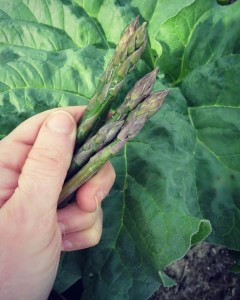
Growing perennial food crops in your garden provides delicious fruit, vegetables and edible flowers year after year. The majority of food plants are annuals that produce for a single season. Perennial plants are unique because they produce several seasons of crops over many years.
Benefits of growing perennial food crops
- Once established, perennials are very easy to maintain. Perennial food plants are not susceptible to diseases or pests like tomato, squash or bean plants.
- Perennial food crops adapt well to less-than-ideal growing conditions. Violets are edible flowers that grow well in shade. Artichokes and horseradish require minimal irrigation.

- Perennial crops improve soil quality. Beds are not tilled, allowing natural decomposition and microbial life to thrive. Many perennials have deep roots that penetrate soil to improve aeration, texture and water absorption.
- Perennial foods are season extenders. Asparagus and rhubarb are the earliest edibles in my garden. I dig and harvest Jerusalem artichokes long after fall frost.
- Although perennial stock is more expensive than annual seed or seedlings, several years of perennial harvests result in cost effective food crops.
Tips to grow a perennial food garden

Carefully consider where to plant perennials. Perennials should be planted and then allowed to grow in that location for several years. Avoid disturbing stock by dedicating a permanent space for a perennial food garden or planting perennial food crops at the edge of your garden.
Give rootstalk a strong start. Remove weeds from area you wish to plant. Till or dig deeply to prepare soil. Amend soil as required. Add compost to give new rootstock a nutritional boost. Plant at recommended depth. Backfill with soil and water deeply.
Don’t harvest completely. Leave some artichoke tubers in the ground and allow some Egyptian walking onion bulbs to fall and replant themselves. Above-ground crowns of rhubarb and alpine strawberries should be left intact, and benefit from an insulating layer of mulch over winter. Leaving some stock encourages perennials to return and expand each year.
8 great perennial foods
- Horseradish
- Asparagus
- Rhubarb
- Jerusalem (tuber) artichokes
- Alpine strawberries
- Elephant garlic
- Egyptian walking onions
- Violets (edible flowers)











